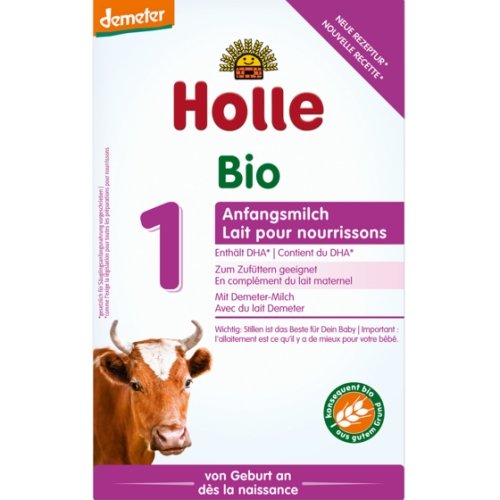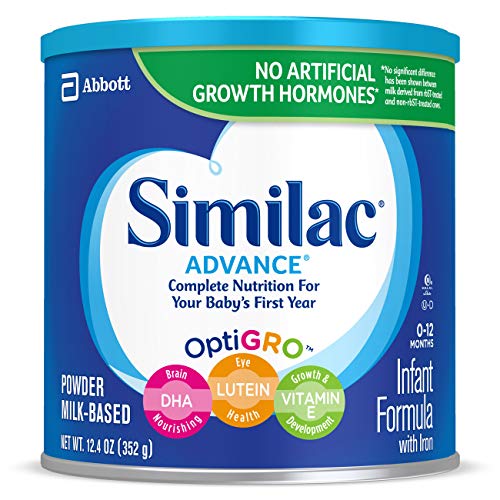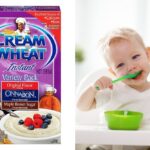For many parents deciding whether to bottle feed or breastfeed is one of the biggest decisions and sometimes the most overwhelming one to make for their new baby’s.
But even when you have decided on one or the other things may not always go to plan. If you decide to breastfeed but have to return to work sooner than expected and unable to produce enough milk, exclusively breastfeeding may not be an option for you.
You may have to start looking at other options. One of these options is supplemental feeding. Plain and simple, this means feeding your baby formula alongside breast milk.
Supplementation provides parents with a clear middle ground. With this option, their choice isn’t laden with guilt and your bay is getting the best of both worlds so to speak.
So is there really a difference between supplemental formula vs regular formula, or is it all the same?
We’re going to have a look at both the best supplemental formulas and regular formulas on the market and see if there are any noticeable differences between the two.
Reasons To Supplement With Formula
There are many reasons that you may want to supplement your breastfeeding with formula. Some of these may be recommended by your pediatrician and some may be through personal choice.
If your baby wasn’t gaining weight or just isn’t feeding well at the breast, this may be a good time to bring in supplementation.
Many newborns also suffer from jaundice and may require extra hydration. And yes, your baby can get all the hydration that they need from your breastmilk, but only once your milk supply has come in.
Some mothers may need to supplement due to their own health reasons. Some reasons may be because they suffer from a chronic illness or have had recent breast surgery they may have trouble breastfeeding.
Those with low weight or suffering from a thyroid condition may not produce enough milk. Although, low milk supply can happen to anyone.
Another reason for supplementation is perhaps when mom is on a certain medication. If this occurs, the formula will be needed while mom will pump her milk and dispose of it.
View in gallery
Personal circumstances are often the reason that people decide to supplement their breastfeeding. Just like if you’re returning to work and you won’t have the time or space to pump during your working hours.
If you have multiples, supplementing can provide mom with a much-needed break from around the clock feeding. A formula is also a great option for any woman who isn’t comfortable breastfeeding in public.
Breastfeeding can be emotionally draining and exhausting and your needs as a person matter too. So if supplementing a few feeds benefits your own mental health, it is the right option for you and your baby.
At the end of the day, you have to take care of yourself so that you can take care of them.
The Main Differences Between Supplemental and Regular Formula
So you have decided that for you and your baby, supplemental feeding is the option you are choosing. But now you have to choose a formula to complement your breastmilk, that your baby will take and that provides the correct nutrition for your baby.
Now you might be thinking: is there a difference between supplemental vs regular formula? Here they are:
- The supplemental formula usually has a higher price point than the regular formula.
- The supplemental formula usually contains a probiotic. But you will also find a regular formula that contains a probiotic similar to that found in breastmilk.
There are a few differences. But, to be honest, if you’re going to supplement feed your baby as I did with a bottle, there’s no real need to purchase a formula specifically. For this, you just need to find a formula that suits your baby and their needs.
Top Supplemental Formula On The Market Today
A supplemental formula is one that you choose to feed alongside your breastmilk. This could be for many reasons some of which we have discussed above.
But it does come down to your own personal choice. There’s no right or wrong choice to be made here.
We’ve looked at some of the best supplemental formulas that are available on the market today and show you the pros and cons of each one.
Holle Organic Non-GMO Formula
This is a European organic baby formula which means that it’s been certified to European standards. This formula is also not a specific supplemental formula.
Holle is a brand well known in Europe for being 100% organic. It’s made from milk from cows raised on Demeter certified farms. This is the top certification for biodynamic farms and requires annual renewal.
It’s also very difficult to come by. These biodynamic farms preserve biodiversity and the ecosystem, and they prohibit the use of any genetically modified organisms.
Holle is 100% organic and contains no artificial preservatives, chemicals, flavors, or colors. It’s certified as organic to European standards which are much higher than those in the US.
This formula is suitable for babies from 0-6 months and is staged in this way as all European formula milk is. Once your baby then reaches 6 months old, you’d need to change to the second stage formula.
Pros
- 100% organic
- Contains no nasty chemicals or artificial preservatives.
- Certified organic to European standards which are higher than US standards
- Contains no corn syrup
- It also contains DHA
Cons
- This is going to be difficult to get. It’s not sold in stores and would need to be purchased online
- It may have longer than normal delivery times. They need to be super organized to ensure you never run out
Similac For Supplementation Non-GMO Infant Formula with Iron
Similac is one of the largest brands in the baby formula world. As you would expect, their Supplementation formula contains Similacs unique blend of OptiGRO as the majority of their formulas do.
OptiGRO contains DHA, Lutein, and Vitamin E which help support brain and eye development along with the development and support of cells within the body. These nutrients are also what is found in breastmilk.
This formula contains no artificial growth hormones. This means that the milk is derived from cows that haven’t been treated with the growth hormone rbST.
It’s also non-GMO, meaning that none of the ingredients have been genetically engineered in any way. Similac Supplemental provides complete nutrition for babies from 0-12 months.
Pros
- Provides complete nutrition for the first 12 months
- Recognized brand
- Contains non-GMO ingredients.
- No artificial growth hormone has been used
- Contains Optigro – these nutrients are also present in breastmilk
Cons
- Some issues with loose stools
- It is quite pricey
[amalinkspro type=”cta-btn-css” ctabtn-id=”” asin=”” apilink=”https://www.amazon.com/dp/B00E4MRWX8?tag=mominformedcom-20&linkCode=osi&th=1&psc=1″ addtocart=”false” new-window=”true” nofollow=”true” alignment=”aligncenter”]Buy on Amazon[/amalinkspro]
Blemil Plus 1 Forte Baby Supplement
View in gallery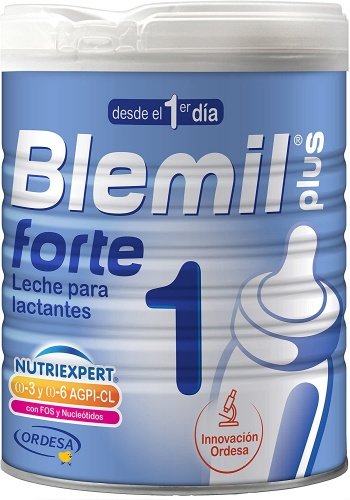
This is the second European formula that is on our list. It’s recommended for baby’s 0-6 months of age and contains a formula called Nutriexpert.
This includes all the essentials that your baby will need in those first 6 months of life to ensure optimal growth and development. It contains prebiotics to promote the production of healthy intestinal flora, nucleotides to guarantee good digestion.
Pros
- Contains Nutriexpert which contains all the natural ingredients in baby’s organic development
- Its composition is close to breast milk
- European formula
- Affordable
Cons
- May be difficult to source
- May incur a high shipping charge
Baby’s Only Organic Whey Protein Toddler Formula
Baby’s only is a certified organic formula that is non-GMO. It contains no added corn syrup and has been rated “Best in Class” by the Clean Label Project.
It uses organic whey protein which is easier for little tummies to digest and contains DHA and ARA that’s naturally derived from organic egg yolks.
Although it states that this is a toddler formula, it is actually suitable for babies under 12 months. It is made in the USA too.
Pros
- Organic ingredients
- Non-GMO
- Rated by the Clean Label Project
- Contains organic DHA
Cons
- You might have trouble sourcing it in traditional brick and mortar stores.
[amalinkspro type=”cta-btn-css” ctabtn-id=”” asin=”” apilink=”https://www.amazon.com/dp/B07QF68HF1?tag=mominformedcom-20&linkCode=osi&th=1&psc=1″ addtocart=”false” new-window=”true” nofollow=”true” alignment=”aligncenter”]Buy on Amazon[/amalinkspro]
Top Regular Formula on the Market Today
Regular baby formula has been designed to mimic breastmilk as much as it can and manufacturers continue to make huge leaps in this process.
All formulas have minimum standards that they have to meet so they’re generally all very similar but many brands now have their own unique blend of nutrients that are normally only found in breastmilk.
These unique blends help them stand out in a sea of other formulas. Most formulas are available in powder, liquid, or ready to drink options. We’ve looked at some of the best formulas available on the market, along with their pros and cons.
Enfamil Enspire Infant Formula
Enfamil Enspire contains MFGM and Lactoferrin. Both are found in breastmilk. MFGM is a fat protein blend that supports brain development and is said to erase the cognitive gap between formula-fed and breastfed babies.
Lactoferrin is an immune building nutrient that’s found at high levels in colostrum. It’s non-GMO, meaning that no ingredients are genetically engineered and are suitable for babies under 12 months old.
Enfamil is the number one pediatrician recommended brand. This particular formula is very expensive which may put it out of reach of some families.
Pros
- Suitable for babies under 12 months
- Contains MFGM and Lactoferrin
- It contains only non-GMO ingredients
Cons
- Very expensive
- Has a metallic taste
- Has been known to cause constipation in some babies
[amalinkspro type=”cta-btn-css” ctabtn-id=”” asin=”” apilink=”https://www.amazon.com/dp/B01ASIEJ3C?tag=mominformedcom-20&linkCode=osi&th=1&psc=1″ addtocart=”false” new-window=”true” nofollow=”true” alignment=”aligncenter”]Buy on Amazon[/amalinkspro]
Gerber Good Start Gentle Powder Infant Formula
This formula is modeled after the complete nutrition of breastmilk. It aims to be as gentle on little one’s tummies as breastmilk is. It contains a blend of DHA, prebiotics, and comfort proteins.
Comfort proteins are small proteins that are easy for baby’s tummies to digest, while DHA helps to support baby’s brain and eye development. It’s a non-GMO formula and doesn’t contain any harsh chemicals.
Pros
- Suitable for babies under 12 months old
- Rich in protein
- Contains no harmful chemicals
- Non-GMO formula
- Probiotic formula
Cons
- Some issues with increased fussiness
- Harder to dissolve than other formulas
[amalinkspro type=”cta-btn-css” ctabtn-id=”” asin=”” apilink=”https://www.amazon.com/dp/B07N4LL847?tag=mominformedcom-20&linkCode=osi&th=1&psc=1″ addtocart=”false” new-window=”true” nofollow=”true” alignment=”aligncenter”]Buy on Amazon[/amalinkspro]
Earth’s Best Organic Dairy Infant Powder
Earth’s Best is suitable for babies under 12 months old and is certified organic. It’s non-GMO which means that no ingredients contained have been genetically modified in any way, no artificial growth hormones, or prohibited synthetic pesticides.
It’s certified organic and is a lactose based powder that contains no added corn syrup solids. It contains Lutein for eyes, prebiotics for immunity, and DHA and ARA for brain and eye development.
Pros
- Non-GMO
- Contains no added corn syrup solids
- Suitable for babies up to 12 months
- Certified organic
Cons
- Unpleasant smell and taste
- Some issues with causing constipation
- Expensive
- Makes some babies gassy and fussy
[amalinkspro type=”cta-btn-css” ctabtn-id=”” asin=”” apilink=”https://www.amazon.com/dp/B001BM4JLC?tag=mominformedcom-20&linkCode=osi&th=1&psc=1″ addtocart=”false” new-window=”true” nofollow=”true” alignment=”aligncenter”]Buy on Amazon[/amalinkspro]
Similac Advance
Similac Advance is suitable for babies from 0-12 months of age and is rich in the nutrients that they require during that time. It contains no artificial growth hormone, no artificial flavoring, or harmful chemicals.
But it does contain Similacs OptiGRO which is a unique blend of DHA, Lutein, and vitamin E. All these nutrients help to support your baby’s brain and eye development.
It also supports cell development within the body. These nutrients are similar to those found in breastmilk.
Pros
- Contains similar nutrients to those found in breastmilk
- Suitable for babies under a year old
- Contains no artificial growth hormone
- Contains OptiGRO to support brain and eye development.
Cons
- It does have quite a strong taste that many babies may not like.
- Some issues with increased gassiness
[amalinkspro type=”cta-btn-css” ctabtn-id=”” asin=”” apilink=”https://www.amazon.com/dp/B000AS1LIM?tag=mominformedcom-20&linkCode=osi&th=1&psc=1″ addtocart=”false” new-window=”true” nofollow=”true” alignment=”aligncenter”]Buy on Amazon[/amalinkspro]
Getting Started With Supplementation
If you’re considering adding a little formula to your breastfed baby’s diet, you’re probably wondering how is best to do it. There are a few different ways to introduce formula and no way or time that is right to do so.
The American Academy of Pediatrics and the World Health Organization both endorse exclusively breastfeeding for at least the first 6 months of your baby’s life.
If this isn’t possible for many reasons experts do encourage breastfeeding for at least the first 3 to 4 weeks, this will help to establish your supply and get your baby used to be breastfed.
No matter if your baby is 3 weeks or 6 months when you decide to add formula to their feeding regime, it’s always best to start a little at a time.
It’s also best to do it when your baby is in good spirits and not when they are starving hungry or tired.
Generally, it’s recommended to start with one bottle a day at the time of day when your baby is at their happiest. Once you have got the one bottle a day routine established, you can then gradually add in additional formula feedings if needed.
View in gallery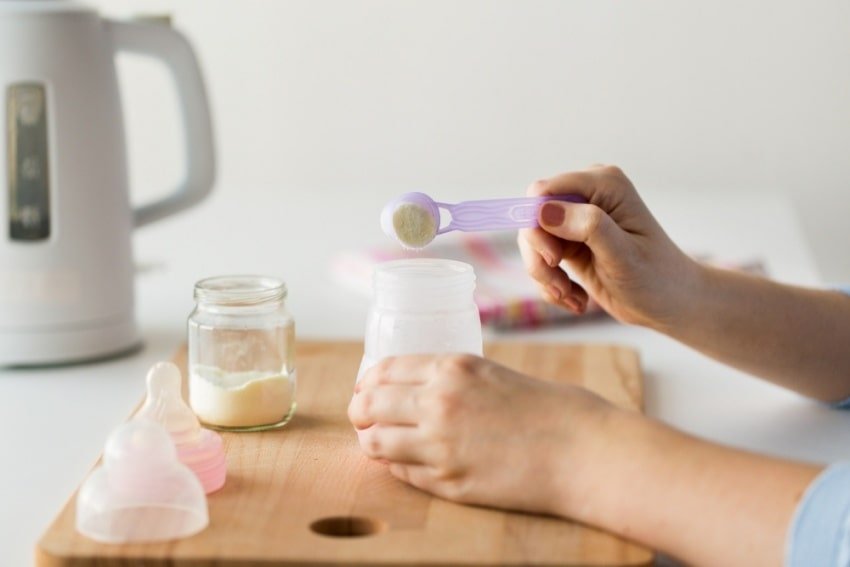
Strategies for successful supplementation
It’s often recommended that you mix your breastmilk with formula milk in order to smooth the transition from one to the other. This is a good idea but does have a drawback.
If once the breastmilk and formula are mixed together your little one decides not to drink it, that liquid gold is going to go to waste.
What about keeping up my supply? One strategy that works well is to breastfeed your baby first then give formula at the end of the feeding.
This does only work if you’re having to supplement feed after each or most feeds. But if this method works for you, it’ll ensure that your milk supply is maintained and your baby is still getting that liquid gold from mom.
Common Problems And Their Solutions
When you begin supplementing your breastmilk, it is very often a bumpy path you have chosen and there is definitely an adjustment period while your baby and you get used to this new normal.
Here are a few key problems that you may encounter and how to overcome them.
Baby has trouble taking milk from a bottle
Bottles are completely different from your breast and the switch over may take your little one by surprise.
They may not be used to the amount of flow from the bottle or nipple you are using. You can try a few different nipples with varying flow levels to see if there is one that suits your baby best.
You could also try repositioning your baby during feeding. The position that is just perfect for breastfeeding may not be ideal for feeding out of a bottle.
Baby is gassy or fussy after formula feeding
It’s normal for babies to have extra gas and seem to be extra colicky after starting formula feeding. In both cases, this is likely due to the intake of extra air.
Baby won’t take a bottle
This is the biggest fear for parents that are supplemental feeding. Your baby is refusing the bottle altogether. Don’t despair there are a few techniques that you can try:
- You could try waiting longer between feedings to increase your baby’s hunger, but not so long as they are a big ball of rage.
- Have someone else give them the bottle
- Offer the bottle at a time of day when your baby is usually in a good mood
- Try dripping a little breast milk on the nipple
- Experiment with the temperature of the formula, but always ensure that it is not too hot.
View in gallery
FAQ
Is it safe to supplement my baby’s diet with formula?
It is completely safe. The formula that you choose to feed your little one contains all the key nutrients that your baby needs to develop and grow at a healthy rate.
I still want to breastfeed. Will formula affect my supply?
Everyone is different so there’s no one answer to fit all. For the majority of women who choose to supplement their breastfeeding, if you’re only supplementing a few times a week, it’s unlikely that it will affect your supply.
But if you do decide to gradually increase the amount of formula, you are supplementing then you may start to notice that your supply will reduce.
If you do find that your supply is dipping, you can always pump your milk and store in in the fridge/freezer so that you can use it later on.
When can I start using formula?
It is recommended that you wait for at least 4 weeks before introducing formula to your breastfed baby. This gives both you and your baby time to get used to breastfeeding and to establish some sort of routine.
What can I expect once I start using formula?
In the beginning, your baby may refuse a bottle, especially if you’re giving it to them. This is mainly because they can smell your milk and associate you with being breastfed.
They’ll more than likely go longer between meals as formula takes longer for their bodies to digest. Their stools will be different in color and texture but this should not be any cause for concern.
The Final Thought
There’s no one option that suits every parent and baby. You have to do what is best for you and your baby. If that’s supplementing your breastmilk a few times a week or every day, it is fine.
If it means having to transition your baby completely to baby formula, that’s ok too. At the end fo the day the most important things are that both you and your baby are happy and healthy!
